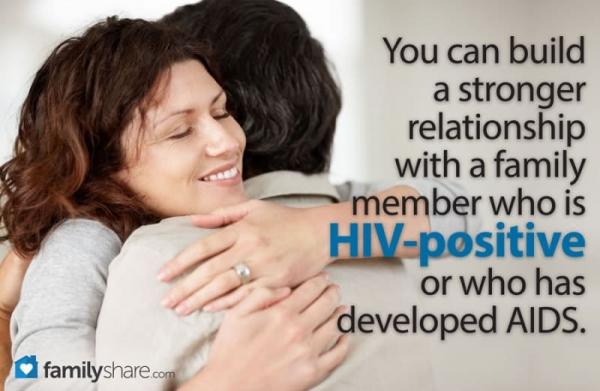
If you have a family member with HIV, the virus that causes AIDS, or one who has developed the disease, the first thing to know is that you have no risk of contracting the disease through casual contact. You can't get it from a hug or a kiss. Start hugging.
The virus is passed through sex, shared hypodermic needles and infected tattoo needles. The blood supply is generally considered safe in the U.S. as it is carefully screened.
Consider the following advice to help you relate with a family member with HIV or AIDS.
Be optimistic
A person with HIV who has not yet developed AIDS can potentially remain healthy for decades and can expect to live a long life. Your interaction with an infected family member should never indicate you think otherwise. Imagine walking up to a friend with diabetes and suggesting she was likely to die soon. That would be absurd. It is no different when talking to a family member with HIV. Go ahead and plan for the future.
Be sensitive
A person with AIDS can be treated successfully and maintain a normal lifestyle for many years. Every case is different so be sensitive to what you see and hear from your family member.
Don't judge
You wouldn't judge a family member who had cancer, diabetes or heart disease. Don't judge a family member with HIV or AIDS.
Get educated
Learn all you can about HIV/AIDS. You can start with a variety of online resources, including the WebMD HIV & AIDS Health Center.
Be supportive
As best you can, put yourself in the place of your family member. Imagine how scared you might feel. Offer the love and support you would want if you had HIV. AIDS patients are sometimes subject to discrimination; your family member will treasure your support if she is subjected to discrimination at work, in housing or at school.
Express love
Many of those with HIV and AIDS report that people treat them differently when they learn about their diagnosis. Be sure that you express your love and affection for your family members just the same after you learn of their diagnosis as before.
Be vigilant
If you are responsible to help care for someone with HIV or AIDS, be vigilant in giving the treatments prescribed by the doctor.
Be helpful
The cost of treatment can reach $15,000 per year for the drugs alone. If you are in a position to help a family member with limited resources, please do so. Note, too, that there are programs available to help people who struggle to afford their drugs to be sure to stay on their drug programs.
By following these tips, you can build a stronger relationship with a family member who is HIV-positive or who has developed AIDS. Many feel they are stigmatized by people who know they have the disease. You may not be able to change how others treat them, but you can control how you treat family members with HIV or AIDS.

